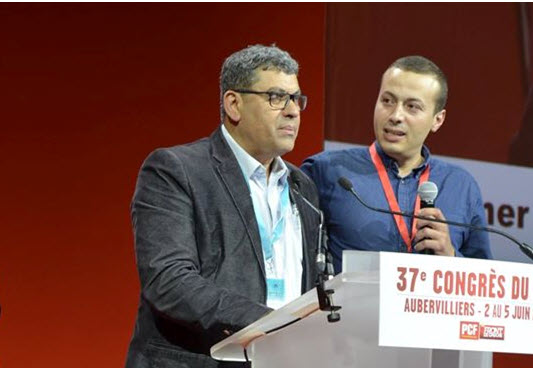Communist Party of Israel (CPI) Secretary General, Adel Amer declared on Thursday evening, June 2, his party’s support for the French proposal to hold a Mideast peace conference later this year. Amer was speaking at the first session of the 37th National Congress of the French Communist Party held in Aubervilliers, a commune in the Seine-Saint-Denis region near Paris.
In contrast to this position, Israel’s far-right government is fiercely opposed to the French initiative. In a joint press conference with Finnish Foreign Minister Timo Soini on Thursday, Prime Minister Benjamin Netanyahu reiterated “Israel’s concerns,” saying that the conference “would allow the Palestinians to evade direct negotiations.”

Adel Amer, Secretary General of the Communist Party of Israel, on Thursday June 2, about to address the 37th National Congress of the French Communist Party held in Aubervilliers (Photo: L’Humanite)
According to Amer, Netanyahu’s far-right government is pursuing a rejectionist policy towards the Palestinian leadership, declaring its own willingness to hold negotiations only so long as the key issues are left off the table: Ending the Israeli occupation of the West Bank and Gaza Strip; establishing an independent Palestinian state alongside Israel with East Jerusalem as its capital; dismantling all settlements and the Separation Wall; and solving the problem of Palestinian refugees, according to UN resolutions.
Escalating Class Conflict in France
The National Congress of the French Communist Party is being held while, in the streets of France, hundreds of thousands of union members, workers and students continue their protests which have been taking place over the last two months. Additional protests and strikes are planned for the coming days, as railway, port and other transport workers plan to continue and extend ongoing work stoppages.
The protests escalated when, on May 17, a controversial “labor law reform” was autocratically enacted by the French government, by means of the undemocratic clause 49-3 of the French constitution, entirely bypassing a vote in the French parliament. “The bosses’ law,” as it is dubbed by its opponents, is disliked by an overwhelming majority of French citizens, as it makes it easier for employers to hire and fire employees and negotiate individual labor contracts outside of industry-wide accords, particularly in the transportation industry. Furthermore, according to a recent poll, only 13% of French citizens approve of the autocratic enactment of this neo-liberal law, seeing it largely as an abuse of executive power in its circumvention of the parliamentary process.
This was the second time in the last three months that French Prime Minister Manuel Valls’ government autocratically enacted anti-worker legislation using clause 49-3, the previous time having been on February 17 with the ramming through of the “Macron Law,” named after the ruling Socialist Party’s economy minister, Emmanuel Macron, a former investment banker, which authorizes more than 200 provisions to bring about large-scale liberalization of the French economy.
Valls, nominally a member of the Socialist Party, and Jean-Christophe Cambadelis, the French Socialist Party’s secretary general, have both lashed out at the striking unions. Union members and ordinary workers say they feel betrayed by both the Valls government and the Socialist Party. The National Front, a far right-wing party, is blaming Syrian and Iraqi refugees and immigrants, as well as the Roma people, more commonly known as Gypsies, for France’s high unemployment, the lack of jobs being the same excuse Valls used to justify the undemocratic enactment of first the “Macron Law” and now “the bosses’ law.” Valls claims he is trying to create a more welcoming business climate in the hopes of decreasing unemployment in France
The CGT (General Confederation of Labor), France’s biggest and oldest union federation, plans ongoing strike actions and work stoppages until the reform “bosses’ law,” is abrogated. Many workers see the new CGT leader, Philippe Martinez, as a dynamic personality with the support to dramatically reshape and rebuild a labor movement that had been declining in influence and power. Martinez also participated in the fist session of the 37th National Congress of the French Communist Party.
Lydia Samarbakhsh, international affairs coordinator for the French Communist Party told the People’s World: “The trade unions, especially the CGT, is trying to block the Prime Minister’s actions every step of the way, including by calling a general strike.” She continued: “The PCF is involved in the mobilizations against the decree and working to unite left forces opposed to the rightist policies led by Valls. For the first time since 2012, the anger within the left has led to mass mobilizations and demonstrations.” Samarbakhsh stressed: “The political landscape, the building of a common political platform to defeat right and far-right parties” in the 2017 presidential and general elections is a priority.
Arguably, popular anger over the neo-liberal labor reform laws could increase in coming months and signal a political sea change prior to the 2017 elections. France’s working class is quite possibly acting as a bulwark against the further erosion of workers’ rights throughout all of Europe. Stopping austerity is a fundamental and urgent question for the French working class, and all workers.


